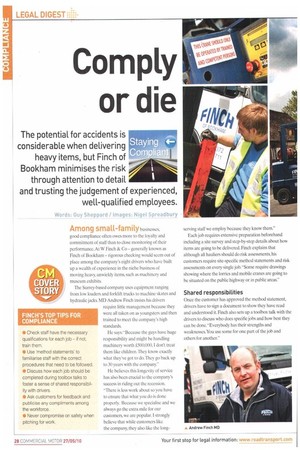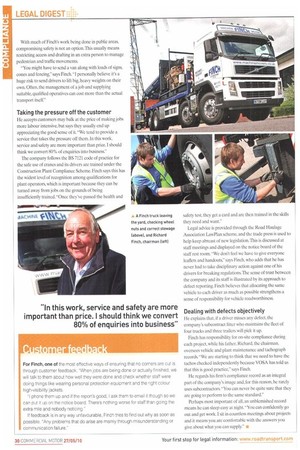• Comply or die
Page 28

Page 30

If you've noticed an error in this article please click here to report it so we can fix it.
The potential for accidents is considerable when delivering heavy items, but Finch of Bookham minimises the risk through attention to detail and trusting the judgement of experienced, well-qualified employees. Words: Guy Sheppard / images: Nigel Spreadbury Among small-family businesses, good compliance often owes more to the loyalty and commitment of staff than to close monitoring of their performance. At W Finch & Co — generally known as Finch of Bookham — rigorous checking would seem out of place among the company's eight drivers who have built up a wealth of experience in the niche business of moving heavy, unwieldy items, such as machinery and museum exhibits.
The Surrey-based company uses equipment ranging from low loaders and forklift trucks to machine skates and hydraulic jacks MD Andrew Finch insists his drivers require little management because they were all taken on as youngsters and then trained to meet the company's high standards.
He says: "Because the guys have huge responsibility and might be handling machinery worth £500.000, I don't treat them like children.They know exactly what they've got to do. They go back up to 30 years with the company."
He believes this longevity of service has also been crucial to the company's success in riding out the recession. "There is less work about so you have to ensure that what you do is done properly. Because we specialise and we always go the extra mile for our customers, we are popular. I strongly believe that while customers like the company, they also like the long serving staff we employ because they know them."
Each job requires extensive preparation beforehand including a site survey and step-by-step details about how items are going to be delivered. Finch explains that although all hauliers should do risk assessments, his customers require site-specific method statements and risk assessments on every single job. "Some require drawings showing where the lorries and mobile cranes are going to he situated on the public highway or in public areas."
Shared responsibilities
Once the customer has approved the method statement, drivers have to sign a document to show they have read and understood it. Finch also sets up a toolbox talk with the drivers to discuss who does specific jobs and how best they can be done. "Everybody has their strengths and weaknesses. You use some for one part of the job and others for another." With much of Finch's work being done in public areas, compromising safety is not an option.This usually means restricting access and drafting in an extra person to manage pedestrian and traffic movements.
-You might have to send a van along with loads of signs, cones and fencing," says Finch. "I personally believe it's a huge risk to send drivers to lift big, heavy weights on their own. Often, the management of a job and supplying suitable, qualified operatives can cost more than the actual transport itself."
Taking the pressure off the customer
He accepts customers may balk at the price of making jobs more labour intensive, but says they usually end up appreciating the good sense of it. "We tend to provide a service that takes the pressure off them. In this work, service and safety are more important than price. I should think we convert 80% of enquiries into business.
The company follows the BS 7121 code of practice for the safe use of cranes and its drivers are trained under the Construction Plant Compliance Scheme. Finch says this has the widest level of recognition among qualifications for plant operators, which is important because they can be turned away from jobs on the grounds of being insufficiently trained. "Once they've passed the health and safety test, they get a card and are then trained in the skills they need and want."
Legal advice is provided through the Road Haulage Association LawPlan scheme, and the trade press is used to help keep abreast of new legislation. This is discussed at staff meetings and displayed on the notice board of the staff rest room. -We don't feel we have to give everyone leaflets and handouts," says Finch, who adds that he has never had to take disciplinary action against one of his drivers for breaking regulations. The sense of trust between the company and its staff is illustrated by its approach to defect reporting. Finch believes that allocating the same vehicle to each driver as much as possible strengthens a sense of responsibility for vehicle roadworthiness.
Dealing with defects objectively
He explains that, if a driver misses any defect, the company's subcontract fitter who maintains the fleet of four trucks and three trailers will pick it up.
Finch has responsibility for on-site compliance during each project, while his father. Richard, the chairman, oversees vehicle and plant maintenance and tachograph records. "We are starting to think that we need to have the tachos checked independently because VOSA has told us that this is good practice," says Finch.
He regards his firm's compliance record as an integral part of the company's image and, for this reason, he rarely uses subcontractors "You can never be quite sure that they are going to perform to the same standard."
Perhaps most important of all, an unblemished record means he can sleep easy at night. "You can confidently go out and get work. I sit in countless meetings about projects and it means you are comfortable with the answers you give about what you can supply." •
































































































































